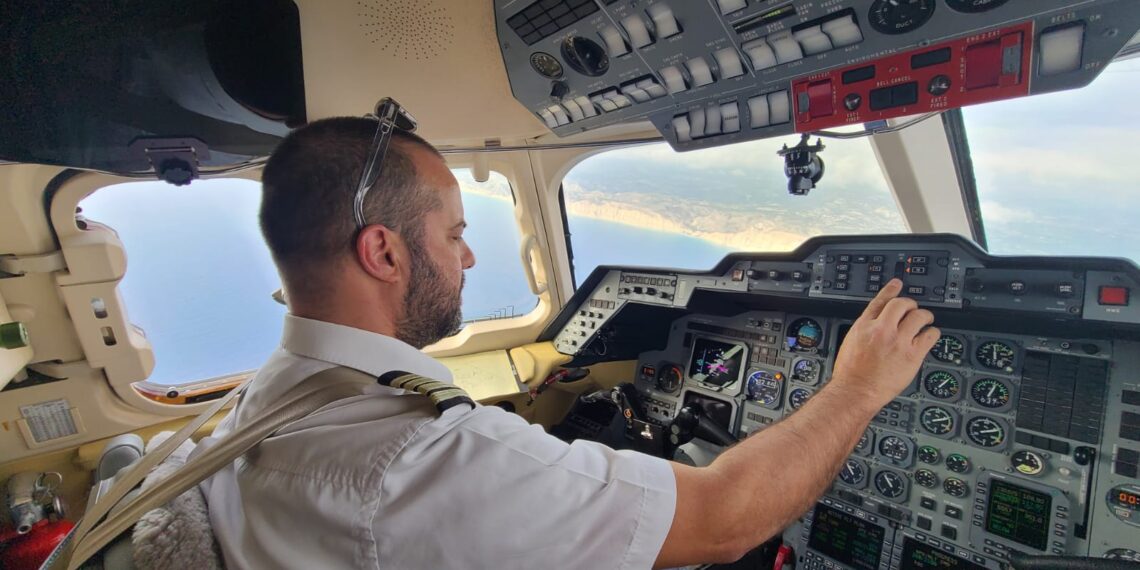Written by Anne Schulze
Ophir Barsheshet, chief operations officer (COO) at SEA Aviation LLC, is dedicated to maintaining high standards in aviation. With over two decades of experience as both a pilot and a strategic leader, Barsheshet ensures secure and efficient operations.
His leadership promotes a culture of reliability and transparency, emphasizing strict adherence to protocols and advancing flight safety within the industry.
A Distinguished Career in Aviation
Captain Ophir Barsheshet, an Israeli and Portuguese citizen, has extensive experience in the aviation industry. He holds an Airline Transport Pilot (ATP) license from the Federal Aviation Administration (FAA) in the United States and Transport Canada Civil Aviation (TCAA) in Canada and an International Civil Aviation Organization (ICAO) Commercial license for CL-604 and HS-125 aircraft.
Since starting his flying career in 1999, Barsheshet has accumulated over 6,663 flight hours, including more than 4,500 hours as a pilot in command. His experience spans roles as first officer and captain on various aircraft, managing critical operations like organ transplant flights and providing VIP and medical transport services.
Beyond his piloting achievements, Barsheshet has greatly contributed to aviation education and training. Since 2011, he has been a Certified Flight Instructor (CFI) in Israel, sharing his aeronautical knowledge with aspiring pilots. At Sky Aviation in Herzliya, he enhanced training processes, developed ICAO-compliant training materials, and led the certification process for a new training simulator.
Barsheshet continues his commitment to aviation safety and education as the COO at SEA Aviation LLC. In this role, he supervises flight instructors, implements advanced flight safety operations, and develops innovative training programs to address the pilot shortage and support industry growth.
Design and Development of Advanced Flight Safety Operations
To ensure an uncompromised commitment to flight safety and security, Captain Barsheshet has designed one of the most advanced flight safety operation programs currently available in the industry. Named the Advanced Aviation Safety Program (AASP), this initiative is structured around a technical methodology to prevent accidents and incidents. “Our main objective is to stay ahead of emerging safety threats by continuously updating our protocols and training methods,” says Barsheshet. This is achieved through the application of advanced technical tools and targeted procedures.
As COO of SEA Aviation, Barsheshet is well-positioned to enhance safety as the foundation of the company’s operations. The AASP strategically improves the detection of safety issues, even those involving alleged violations of Title 14 of the Code of Federal Regulations (14 CFR). One notable innovation is the automated Memorandum of Understanding (MOU) generator, which creates demonstration or continuing ASAP MOUs that fully comply with FAA ASAP guidance. This tool expedites the FAA review and acceptance process, greatly enhancing the detection and correction of safety problems.
Additionally, the AASP optimizes the planning and design of redeployment procedures that directly impact flight safety operations. Specific areas affected include survey logistic support to analyze logistical needs, planning through graphical representations, and analysis for aircraft recovery using laser scanners to create accurate visual representations of accident scenes. The program also incorporates 3D modeling to create immersive virtual reality scenarios, enhancing training and emergency response capabilities. This comprehensive approach utilizes advanced technical knowledge and technologies to reduce human errors and improve overall flight safety substantially.
Preparing the Aviation Industry for Future Challenges
Barsheshet is focused on preparing the aviation industry for future safety challenges and technological advancements. His strategies include incorporating new technologies and training programs to maintain resilience and adaptability.
“Our main objective is to stay ahead of emerging safety threats by continuously updating our protocols and training methods,” Barsheshet remarks. He emphasizes the importance of enhanced safety monitoring and improved decision-making processes.
Captain Ophir Barsheshet has demonstrated a solid dedication to aviation safety and education throughout his career. From his extensive flight experience to his leadership in developing advanced safety programs, Barsheshet has greatly impacted the industry. His focus on improving safety protocols, fostering transparency, and addressing the pilot shortage through new training programs highlights his commitment to a better future for aviation.




















